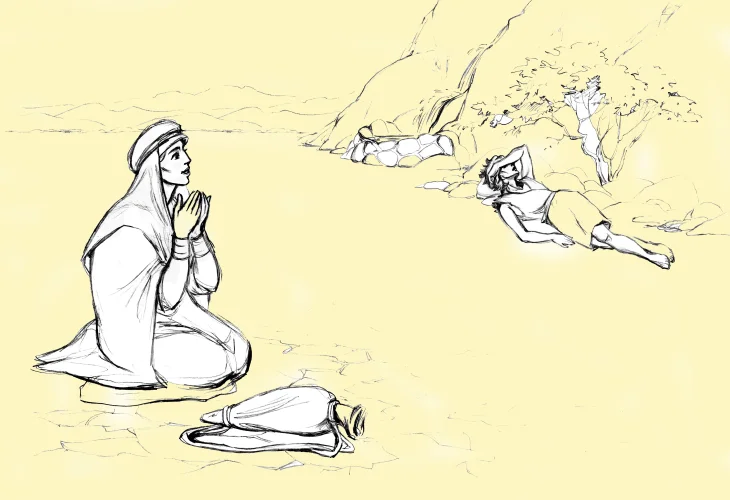A Nation's Journey: The Impact of Ishmael's Departure on Jewish Destiny
Explore how the biblical story of Hagar and Ishmael resonates through the history of Israel, shaping its path and identity.
 (Illustration: shutterstock)
(Illustration: shutterstock)Hagar was once the wife of Abraham, albeit for a brief period, and Ishmael, his son. As we delve into their story, we find reflections and omens for the fate of the Jewish people.
The narrative of the Jewish people truly begins with the birth of Isaac, marking the fulfillment of Hashem's promise, "Your descendants will become a great nation." However, prior to Isaac's birth, the Torah dedicates significant attention to Hagar and Ishmael's saga. Hagar, who was Abraham's wife for a time, and his son Ishmael, play a crucial role in the unfolding story, worthy of detailed mention in the Torah.
As we follow their tales, we observe that Hagar and Ishmael's actions contain signs for future generations of Israel.
Hagar, originally Egyptian, travels to the land of Canaan, where Sarah persecutes her. She wanders the desert, eventually returning to Egypt at the story's conclusion.
Similarly, the children of Israel originate from Canaan, descend into Egypt, face persecution, and are driven to wander the desert, ultimately returning to the land of Israel.
The Ramban reveals that the decree "They will enslave and oppress them," spoken to Abraham, stemmed partly from Abraham and Sarah's treatment of Hagar and Ishmael.
It is understood that the transgressions of our ancestors were minor, subtle lapses, often beyond our comprehension. Nonetheless, Abraham and Sarah had valid reasons for their actions, yet Hashem scrutinizes even the righteous meticulously, finding truth in these assessments.
"And Sarai mistreated her"—Sarah oppressed Hagar because she conceived. Likewise, the Egyptians oppressed the Israelites for being fruitful and multiplying. Hashem continued to increase the Israelites despite this, "They were fruitful and multiplied," and similarly, the angel of Hashem promised Hagar, "I will greatly increase your descendants."
Hagar fled "toward the desert of Shur," where she encountered the angel of Hashem at "Beer-lahai-roi, between Kadesh and Bered." She roamed the desert again, "the water was gone... Do not let me see the child die... she sat down a distance away and wept," until a miracle occurred: "Hashem opened her eyes and she saw a well of water."
In parallel, Israelites "went toward the desert of Shur... and found no water." "An angel of Hashem appeared to him... Let us go into the wilderness... I have heard their cries." "They stayed at Kadesh many days." "The entire congregation lifted their voices and wept... Would that we had died in this wilderness." "He cried out to Hashem, and Hashem showed him a piece of wood, which he threw into the water, and the water became sweet." "This is the well of which Hashem spoke to Moses, saying, Gather the people and I will give them water."
Even though Hagar's dismissal was justified, and Hashem said, "Send away this slave woman and her son," supporting Sarah's decision, "Whatever Sarah tells you, listen to her," there is still an element of reproof for the patriarchs, underscored by the Torah's narrative parallels. Abraham's minor actions could lead to four hundred years of hardship for his descendants, and yet, good deeds have greater influence: thanks to Abraham's covenant and deeds, we have withstood three thousand years of exile, witnessing Hashem's kindness and miracles repeatedly.
In the end, despite the similarities, the Israelites settled in the wilderness of Paran, but ascended from there to the land of Israel. Hashem chose them and granted them the land, whereas Ishmael "settled in the wilderness of Paran and his mother took a wife for him from Egypt." He found peace in Paran and a wife from Egypt, but remained outside the chosen land. Only when the Israelites sinned did the merit of Abraham act as the scourge of Hashem's wrath upon them. Indeed, Ishmael holds a merit, that of the covenant of circumcision, the covenant of Abraham. The antidote to Ishmael is to increase our merits, emulate Abraham's deeds, and thus truly gain an advantage over him.

